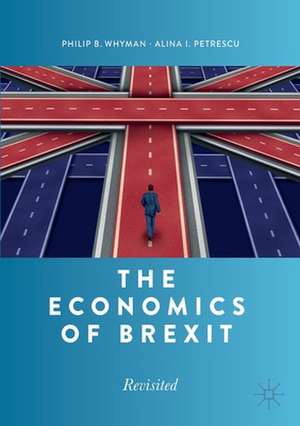The Economics of Brexit: Revisited
Autor Philip B. Whyman, Alina I. Petrescuen Limba Engleză Paperback – 6 ian 2021
The Economics of Brexit – Revisited therefore maintains its position as the most comprehensive analysis of the economics of Brexit in the market today.
| Toate formatele și edițiile | Preț | Express |
|---|---|---|
| Paperback (2) | 242.91 lei 3-5 săpt. | +29.94 lei 6-10 zile |
| Springer International Publishing – 6 ian 2021 | 242.91 lei 3-5 săpt. | +29.94 lei 6-10 zile |
| Springer International Publishing – 6 sep 2017 | 256.64 lei 3-5 săpt. |
Preț: 242.91 lei
Nou
Puncte Express: 364
Preț estimativ în valută:
46.48€ • 50.65$ • 39.17£
46.48€ • 50.65$ • 39.17£
Carte disponibilă
Livrare economică 02-16 aprilie
Livrare express 18-22 martie pentru 39.93 lei
Preluare comenzi: 021 569.72.76
Specificații
ISBN-13: 9783030559472
ISBN-10: 3030559475
Pagini: 426
Ilustrații: XXXVII, 390 p. 71 illus., 69 illus. in color.
Dimensiuni: 148 x 210 x 30 mm
Greutate: 0.56 kg
Ediția:1st ed. 2020
Editura: Springer International Publishing
Colecția Palgrave Macmillan
Locul publicării:Cham, Switzerland
ISBN-10: 3030559475
Pagini: 426
Ilustrații: XXXVII, 390 p. 71 illus., 69 illus. in color.
Dimensiuni: 148 x 210 x 30 mm
Greutate: 0.56 kg
Ediția:1st ed. 2020
Editura: Springer International Publishing
Colecția Palgrave Macmillan
Locul publicării:Cham, Switzerland
Cuprins
Chapter One. The Elusive Economic Consensus over Brexit.- Chapter Two. The Fiscal Impact of Brexit.- Chapter Three. Brexit and Trade.- Chapter Four. Foreign Direct Investment.- Chapter Five. Regulation.- Chapter Six. Migration and the Labour Force.- Chapter Seven. Economic Growth and Productivity.- Chapter Eight. Economic Policy Considerations.- Chapter Nine. Alternative Trading Models After Brexit.
Recenzii
Notă biografică
Philip B. Whyman is Professor of Economics and Co-Director of the UCLan Research Centre for Business, Management and Enterprise (URCBME), at the Lancashire School of Business and Enterprise, University of Central Lancashire, UK. Philip has authored, co-authored or co-edited twenty books and more than 50 articles in learned journals. His areas of research include European economics and the economics of Brexit, economic policy and labour economics.
Alina I. Petrescu is Research Fellow in Labour Economics at the University of Central Lancashire, UK. Alina's research covers aspects of the economics of European integration and labour economics, in particular workplace flexibility practices and their ability to improve company and employee performance.
Alina I. Petrescu is Research Fellow in Labour Economics at the University of Central Lancashire, UK. Alina's research covers aspects of the economics of European integration and labour economics, in particular workplace flexibility practices and their ability to improve company and employee performance.
Textul de pe ultima copertă
The Economics of Brexit – Revisited builds upon and extends the analysis contained within the authors' previous book, The Economics of Brexit: A Cost-Benefit Analysis of the UK's Economic Relationship with the EU, which arguably represented the most comprehensive and systematic evaluation of the UK’s economic relationship with the EU. The Economics of Brexit – Revisited continues where the previous volume left off, given that the UK has now formally withdrawn from the EU, and therefore the focus of the evidence presented concerns the potential economic implications arising from Brexit and considering the options available to those negotiating the UK's future economic relationship both regionally and globally. The Economics of Brexit – Revisited seeks to provide greater clarity to a range of issues that have been hotly debated over the past few years, ranging from the trade and fiscal implications of Brexit, to the economic impact of regulation and migration. The significance of different Brexit options are discussed in detail, including the significance of demands for regulatory harmonisation (the 'level playing field'), along with their implications for UK trade with the EU and the rest of the world. A wide range of economic analyses are evaluated to determine their relative methodological strengths and weaknesses, and ultimately whether their conclusions are sufficiently robust to engender confidence. Finally, noting that a key determinant of the effectiveness of any post-Brexit economic strategy depends upon the degree of flexibility created for economic policy, the book provides an extended examination of the potential relating to different economic policy options available to the UK government, depending upon the form of final trade settlement that is agreed with the EU. These policy options include more active forms of macroeconomic management, combined with industrial and procurement policy. The Economics of Brexit – Revisited therefore seeks to combine evaluation of the available evidence indicating the economic impact of Brexit, together with consideration of policy trade-offs that lie at the heart of the choices surrounding Brexit, and how these might be resolved.
The Economics of Brexit – Revisited therefore maintains its position as the most comprehensive analysis of the economics of Brexit in the market today.
The Economics of Brexit – Revisited therefore maintains its position as the most comprehensive analysis of the economics of Brexit in the market today.
Caracteristici
Allows fresh analysis of likely post-Brexit trade frictions, which has formed the core argument for a customs union Provides a more detailed discussion relating to the UK’s industrial strategy and the extent to which different Brexit options allow regulatory difference Incorporates the latest data, thereby enabling firmer conclusions to be drawn as to the effects that the referendum result has had thus far on the UK economy
